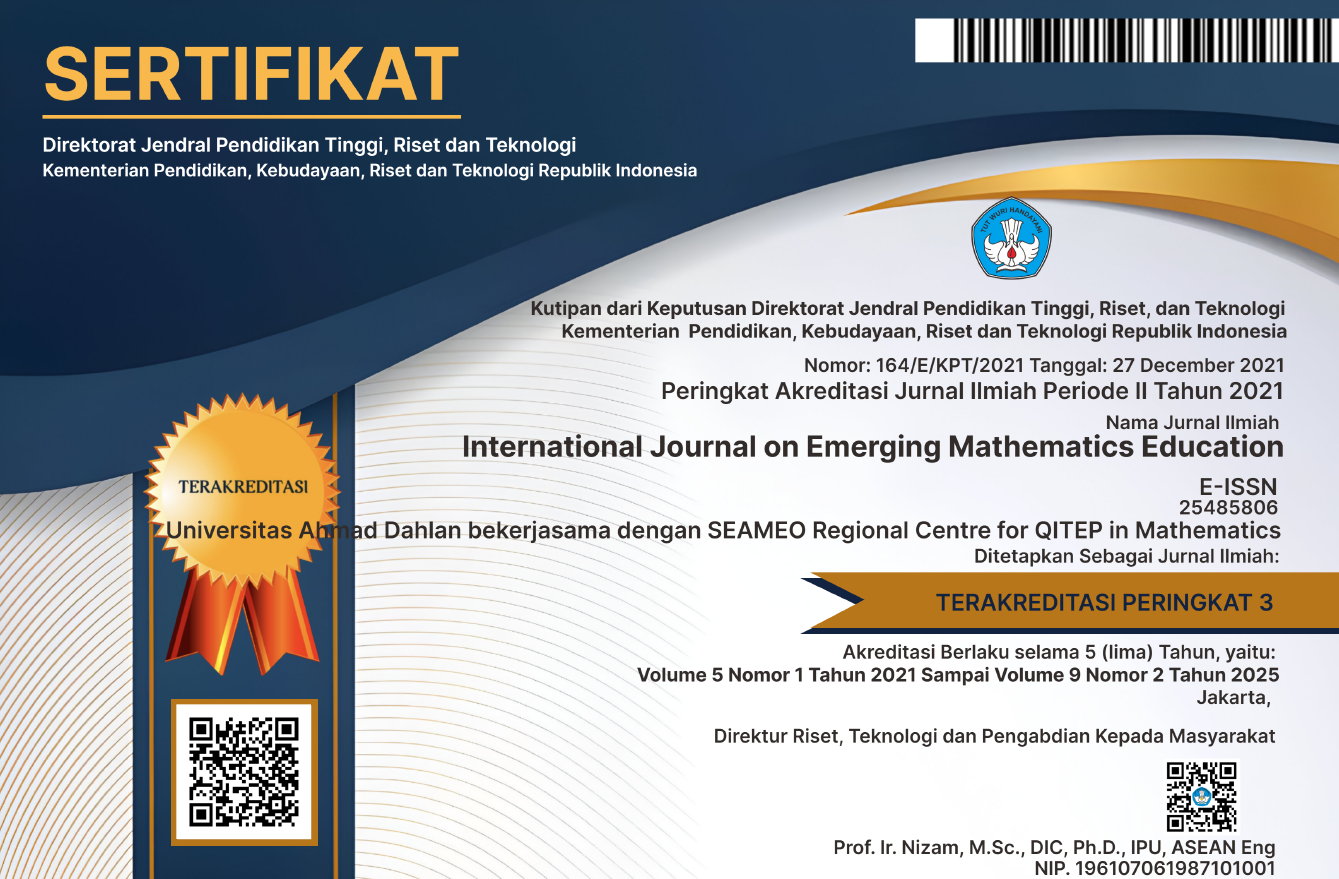MURDER Cooperative Learning Model through Edmodo Toward Mathematics Problem Solving and Motivation of Students
DOI:
https://doi.org/10.12928/ijeme.v4i1.15845Keywords:
MURDER cooperative model, Edmodo, Problem Solving, Learning MotivationAbstract
MURDER cooperative learning model is based on cognitive theory that focuses on how humans acquire, embed, and process what they learn, as well as how the thinking and learning process occurs. This study aims to (1) determine whether the Edmodo-assisted MURDER cooperative learning model has a positive effect on students' problem solving ability and students’ motivation in learning mathematics (2) determine whether the Edmodo-assisted MURDER cooperative learning model has a positive effect on students' mathematical problem solving abilities (3) to determine whether the The MURDER cooperative learning model assisted by edmodo has a positive effect on students' motivation to learn mathematics. The research method used is a quasi experiment (quasi experiment) with the research hypothesis testing technique used is MANOVA. The experimental results show that (1) the problem solving ability and motivation to learn mathematics of students who take the Edmodo-assisted MURDER cooperative learning model is significantly better than problem solving ability and motivation to learn mathematics of students who take conventional learning, (2) the mathematics problem solving ability of students who following the Edmodo-assisted MURDER cooperative learning model is significantly better than the mathematics problem solving ability of students who take conventional learning, (3) the motivation to learn mathematics of students who take the Edmodo-assisted MURDER cooperative learning model is significantly better than the motivation to learn mathematics of students who take conventional learning .
References
Ariningsih, N. M., Suami, N. K., & Suranata, K. (2013). Pengaruh Model Pembelajaran Kooperatif Tipe MURDER Berbantuan LKS Terhadap Hasil Belajar IPA Siswa Kelas V SD Gugus IV Kecamatan Tabanan. Jurnal [Online]. Jurusan PGSD. FIP. Universitas Pendidikan Ganesha.
Balasubramanian, K., Jaykumar, V., & Fukey, L. N. (2014). A Study on “Student Preference towards the Use of Edmodo as a Learning Platform to Create Responsible Learning Environmentâ€. Procedia-Social and Behavioral Sciences, 144, 416-422.
Benning, I. (2018). Using Technology in Mathematics: Professional Development for Teachers. Otago: University of Otago Press.
Darmika, N. K., Suma, K., & Suastra, I. W. (2014). Pengaruh Model Pembelajaran Kooperatif MURDER Terhadap Motivasi Belajar dan Prestasi Belajar IPA Siswa SMP. e-Journal Program Pascasarjana Universitas Pendidikan Ganesha Program Studi IPA, 4.
Departemen Pendidikan Nasional. (2013). Permendiknas Nomor 64 tentang Standar Isi Mata Pelajaran Matematika
Elnanda, Rici. 2014. Pengaruh Model Pembelajaran Collaborative MURDER Terhadap Kemampuan Pemahaman Konsep Matematika Siswa. Thesis. Jakarta: UIN Syarif Hidayatullah Jakarta
Fung, M.G., & Roland, L. (2004). Writing, reading, and assessing in an elementary problem solving class. In problems, resources, and issues in mathematics undergraduate studies. Problems, Resources, and Issues in Mathematics Undergraduate Studies, 14(4), 289-302.
Indah, P. (2019). Efek Program PISA Terhadap Kurikulum di Indonesia. Jurnal Pendidikan dan Kebudayaan, 4(1), 51-71.
Juniantari, M., Sariyasa., & Sadra, I. W. (2015). Pengembangan Perangkat Pembelajaran Matematika Realistik Bagi Siswa SMP Kelas VII dengan Seting Model Kooperatif MURDERâ€. Proceedings Seminar Nasional FMIPA UNDIKSHA V Tahun 2015. 178183.
Mertasari, N. M. S. (2003). Pengaruh Model Tes Terhadap Motivasi Belajar dengan Mempertimbangkan Kesukaran Tes (Eksperimen Pada Sekolah Lanjutan Tingkat Pertama di Kota Singaraja). Thesis. Singaraja: IKIP Negeri Singaraja (UNDIKSHA)
OECD. (2016). Country Note: Indonesia. Program for international student assessment (PISA) Result from PISA 2015.
OECD. (2018a). PISA Result in Focus.
Richmond, G., & Striley, J. (1996). Making Meaning in Classrooms: Social Processes in Small-Group Discourse and Scientific Knowledge Building. Journal of Research in Science Teaching, 33(8), 839—858.
Polya, G. (1985). How to Solve It: A new aspect of mathematics method (2 ed). Princeton: Princeton University Press.
Ruseffendi, E.T. (1991). Pengantar kepada membantu Guru Mengembangkan Kompetensinya dalam Pengajaran Matematika untuk Meningkatkan CBSA (Cetakan Kedua). Bandung: Tarsito.
Santyasa, I W. (2012). Pembelajaran Inovatif. Singaraja: Undiksha
Sardiman, A.M. (2011). Interaksi dan Motivasi Belajar Mengajar. Jakarta: Rajawali.
Sugiyono. (2012). Metode Penelitian Pendidikan. Bandung: Alfabeta.
Saxena, R. (2016). Teaching Mathematical Modeling in Mathematics Education. Journal of Education and Practice, 7(11), 34-44.
Downloads
Published
How to Cite
Issue
Section
License
License and Copyright Agreement
In submitting the manuscript to the journal, the authors certify that:
- They are authorized by their co-authors to enter into these arrangements.
- The work described has not been formally published before, except in the form of an abstract or as part of a published lecture, review, thesis, or overlay journal. Please also carefully read the International Journal on Emerging Mathematics Education (IJEME) Author Guidelines at http://journal.uad.ac.id/index.php/IJEME/about/submissions#authorGuidelines
- That it is not under consideration for publication elsewhere,
- That its publication has been approved by all the author(s) and by the responsible authorities, tacitly or explicitly, of the institutes where the work has been carried out.
- They secure the right to reproduce any material that has already been published or copyrighted elsewhere.
- They agree to the following license and copyright agreement.
Copyright
Authors who publish with the International Journal on Emerging Mathematics Education (IJEME) agree to the following terms:
- Authors retain copyright and grant the journal the right of first publication with the work simultaneously licensed under a Creative Commons Attribution License (CC BY-SA 4.0) that allows others to share the work with an acknowledgment of the work's authorship and initial publication in this journal.
- Authors are able to enter into separate, additional contractual arrangements for the non-exclusive distribution of the journal's published version of the work (e.g., post it to an institutional repository or publish it in a book), with an acknowledgment of its initial publication in this journal.
- Authors are permitted and encouraged to post their work online (e.g., in institutional repositories or on their website) prior to and during the submission process, as it can lead to productive exchanges, as well as earlier and greater citation of published work.
![]()
Ciptaan disebarluaskan di bawah Lisensi Creative Commons Atribusi-BerbagiSerupa 4.0 Internasional.




